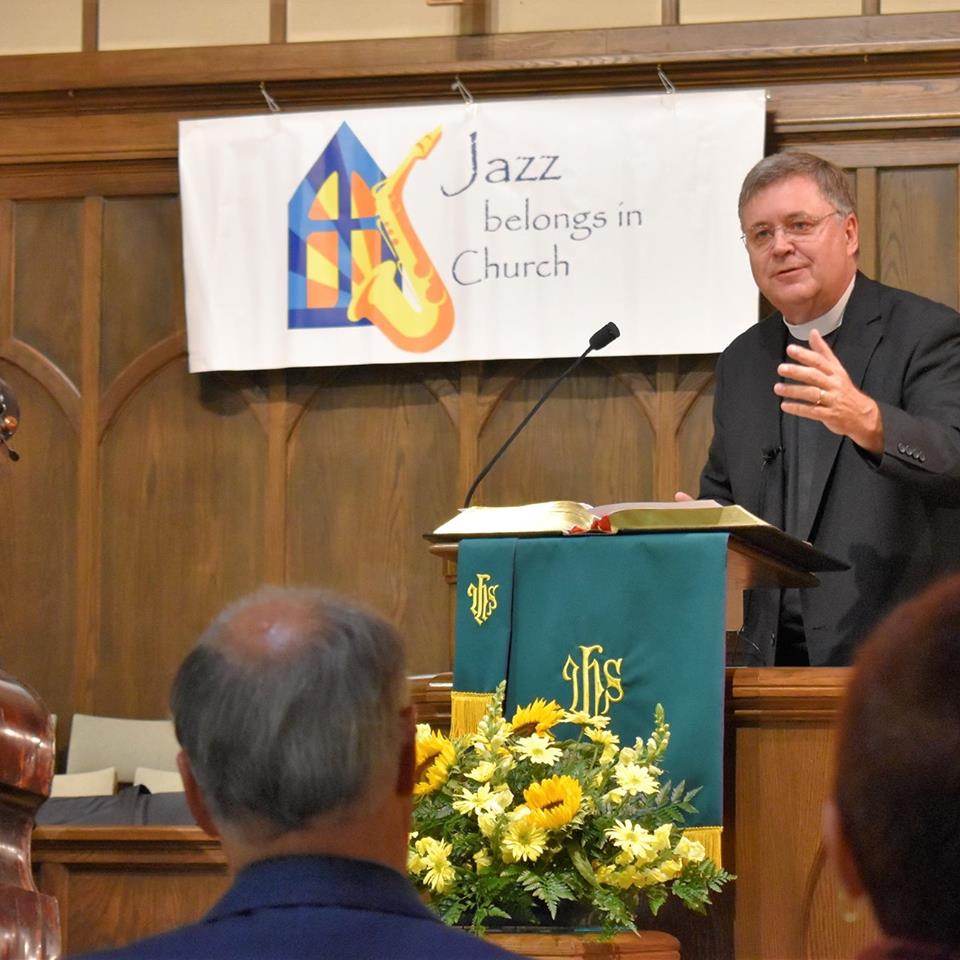Pastoring Through Jazz
June 26, 2024 | Alumni, Community, Featured, Public

Bill Carter was torn. Since he was a boy, he loved music, especially jazz. He imagined a future in moody lounges and smoky bars, riffing under the hot lights, making music.
But God was calling, making a convincing case for a life of ministry, a future in the pulpit.
William G. Carter, MDiv ‘85, thought he had to make a choice. Turns out, God was calling him to a new thing, a world where music and ministry could co-exist – and thrive.
“It was a holy invitation that I had to step into,” says Carter, who has been pastor and head of staff at the First Presbyterian Church of Clarks Summit, Pennsylvania, for just shy of 34 years. “I had to rethink everything. Giving up music? No, that’s part of my life. I’m not giving up pastoral ministry because that’s also part of my life. So, I began to weave it all together.”
He has woven a joyful life, maintaining a dual career as a jazz pianist, leader of the Presbybop Quartet, and a Presbyterian minister. He is the author of 12 books, including his latest, Thriving on a Riff: Jazz and the Spiritual Life, released in April on Broadleaf Books. The book explores the spiritual dimensions of jazz and how the music connects the secular and the sacred.
Bill is regarded as a leading authority on the use of jazz music in liturgical settings and is the editor of the jazz hymnal Swing a New Song to the Lord: Jazz Resources for Worship.
A gifted pianist, he began composing music as early as 8th grade. By 11th grade, a teacher invited him to fill in with his band on piano. For the rest of his senior year and through four years at Binghamton University, he played in one bistro after another. He created a couple of ensembles and played as much as possible.
“I thought briefly about going into music,” he says, “but I went to study pre-med. God spoke up to me in calculus-based physics and said, ‘Get out of here.’
“Around that time, I had some profound faith experiences that invited me toward pastoral ministry. I tried to figure out how to suspend the music while I was doing that — and did not do a really good job.”
All through college, he continued to play – and to change majors. He joined the college jazz band, where his teacher offered to count his work as an independent study if he would compose some big band arrangements. That professor saw his potential and helped him connect with professional musicians and arrangers.
“Yet, I still had this calling and I thought God wanted me to hang up the music on a shelf, he says. “So, I went to Princeton, and it kept coming back.” Soon Princeton Seminary President, Thomas Gillespie booked him for the faculty Christmas party. That led to other musical opportunities. Then his field education supervisor suggested they compose a jazz service for church, he was all in.
He graduated and joined his first church in Pennsylvania’s Lehigh Valley. It was when he went to his current church in Clarks Summit, PA, that his two loves came together.
“The day that I preached, and the congregation voted on me (they voted yes), a man stands up in the back of the sanctuary and says, ‘We’ve heard you preach and that was fine. Now let’s hear you play something on the piano.’
“I said, ‘Well, okay, but I’m not here to do that. I’m here to be your pastor. And they said, ‘Well, that’s what you think.’”
Since then, jazz has been a significant partner in his ministry, including in what is now a regular standing-room-only event – the last Sunday of summer is always a jazzed-up service with original music and some great preaching.
Princeton Seminary’s impact on his life has been significant.
He served on the Alumni Council for almost a decade and later was elected an Alumni Trustee for a three-year term. It was never a question for him whether to give back.
“I had a sense when I was at Princeton that my world was expanding. I can remember one day walking back to my dormitory and I had almost blown off the Friday communion service because I didn’t know who was preaching. It turns out, we had a preacher that morning who presided over the table and paused, and said, ‘In my native land, I could not have presided over a table like this where there are people with different backgrounds.’ It was Alan Boesak (a Dutch Reformed Church cleric, politician, and anti-apartheid activist) from South Africa.”
Wow. At Princeton Seminary, you never know who’s on campus.
Early on, he found being on campus “sobering … because everybody was so smart. Everybody was so capable. I spent much of my first year wondering what everyone was talking about.”
It was a while before he finally realized that “at the end of the day, I was worthy of standing with these other folk. That we were all in this enterprise together. It was an affirming time.”
In the end, he knows one thing for sure about Princeton Seminary.
“What’s the thing I can say about Princeton Seminary, about my education? Can I say that it prepared me for a lifetime of continuing study? Can I say that I learned just enough to know that I didn’t know anything? It taught me that I need to keep going, to keep learning.”





